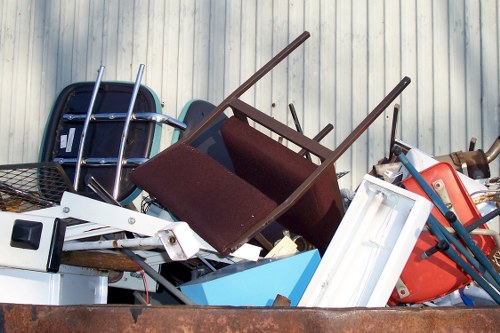Waste Recycling in Newington: A Comprehensive Guide

Introduction to Waste Recycling
Waste recycling is an essential process in Newington, helping to reduce the amount of waste that ends up in landfills. By recycling, residents and businesses can contribute to a cleaner environment and promote sustainable living.
In Newington, various recycling programs are available to handle different types of waste, including paper, plastic, glass, and metals. Understanding how to properly recycle can make a significant impact on the community and the planet.
Moreover, waste recycling in Newington not only benefits the environment but also supports the local economy by creating jobs and fostering green businesses.

Types of Recyclable Materials
Paper and Cardboard
Paper and cardboard are among the most commonly recycled materials in Newington. They can be easily collected and processed into new products, reducing the need for virgin materials.
Plastics
Recycling plastics helps to minimize pollution and conserve resources. Newington has specific guidelines for different types of plastics to ensure effective recycling.
Glass
Glass recycling is straightforward and highly efficient. It can be melted down and reformed into new glass products without losing quality.

Recycling Programs in Newington
Newington offers various recycling programs tailored to meet the needs of different residents and businesses. These programs include curbside pickup, drop-off centers, and special collection events.
Participation in these programs is encouraged to maximize recycling efforts. By following the guidelines and schedules, communities can ensure that recyclable materials are properly processed.
Additionally, educational initiatives are in place to inform the public about the importance of recycling and how to participate effectively.

Benefits of Recycling in Newington
- Environmental Protection: Reduces pollution and conserves natural resources.
- Economic Growth: Creates jobs and supports green businesses.
- Community Health: Decreases landfill use and improves overall sanitation.
- Energy Savings: Recycling processes often require less energy compared to producing new materials.
These benefits highlight why recycling is a critical component of Newington’s sustainability efforts.

How to Get Involved
Residents can get involved in waste recycling by following local guidelines, participating in community clean-up events, and spreading awareness about the importance of recycling.
Businesses can also contribute by implementing recycling programs, reducing waste, and choosing sustainable practices. Collaboration between individuals and organizations can amplify the impact of recycling efforts.
Furthermore, staying informed about new recycling technologies and initiatives in Newington can help the community stay ahead in sustainability practices.
Nearby Areas and Their Recycling Efforts
Newington is surrounded by several areas that also prioritize waste recycling. These include:
- Brookfield: Known for its comprehensive curbside recycling program.
- Fairview: Home to several recycling centers and sustainability projects.
- Greenville: Offers specialized recycling for electronics and hazardous materials.
- Hilltop: Encourages community participation through local recycling drives.
- Lakeside: Focuses on recycling glass and plastics efficiently.
- Maplewood: Supports both residential and commercial recycling initiatives.
- Oakridge: Integrates recycling education into its local schools.
- Pinecrest: Hosts regular recycling workshops and events.
- Riverside: Implements innovative recycling technologies.
- Sunnyvale: Promotes zero-waste goals through extensive recycling programs.
Challenges and Solutions
Despite the benefits, waste recycling in Newington faces several challenges, including contamination of recyclable materials and limited participation rates.
To overcome these challenges, Newington has implemented strict guidelines on what can be recycled and provides educational resources to help residents sort their waste properly.
Additionally, incentives such as reduced waste collection fees and recognition programs encourage more people to participate in recycling efforts.
Future of Waste Recycling in Newington
The future of waste recycling in Newington looks promising, with plans to expand recycling facilities and introduce new technologies that make recycling more efficient and effective.
Innovative approaches, such as automated sorting systems and community-based recycling programs, are being explored to enhance the overall recycling process.
Continued collaboration between the local government, businesses, and residents will be key to achieving long-term sustainability goals.
Conclusion
Waste recycling in Newington plays a vital role in promoting environmental sustainability and community well-being. By actively participating in recycling programs and supporting local initiatives, residents and businesses can contribute to a greener and more sustainable future.
Understanding the types of recyclable materials, utilizing available resources, and staying informed about recycling efforts are essential steps in making a positive impact.
Together, the community can overcome challenges and achieve significant progress in waste recycling, ensuring a better environment for generations to come.
Frequently Asked Questions
1. What materials can be recycled in Newington?
In Newington, common recyclable materials include paper, cardboard, plastics, glass, and metals. Additionally, certain electronics and hazardous materials can also be recycled through specific programs.
2. How can I participate in the curbside recycling program?
Residents can participate in the curbside recycling program by separating their recyclables from regular waste and placing them in designated bins on collection days. It’s important to follow the local guidelines to ensure proper recycling.
3. Are there any fees associated with recycling in Newington?
Recycling services in Newington are generally included in the municipal waste management fees. Some specialized recycling services may have additional fees, depending on the type and quantity of materials.
4. How does recycling benefit the local economy?
Recycling supports the local economy by creating jobs in the recycling and processing industries. It also fosters the growth of green businesses and reduces the costs associated with waste management.
5. What can I do to reduce contamination in recycling?
To reduce contamination, ensure that recyclables are clean and free from food residue, avoid mixing non-recyclable items with recyclables, and follow the specific sorting guidelines provided by Newington’s recycling program.